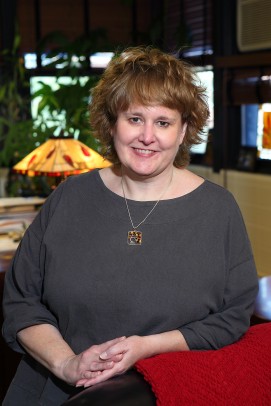2016 University Scholar Joy Hammel

“I want to use this award as an opportunity to spread the word and transfer information about disability advocacy and equal rights to our campus and our communities,” says Joy Hammel, professor of occupational therapy. Photo: Jenny Fontaine
The University Scholars Program, now in its 32nd year, honors faculty members for superior research and teaching, along with great promise for future achievements. The award provides $15,000 a year for three years.
Joy Hammel, a professor in the UIC College of Applied Health Sciences, views her University Scholar award as an honor — and an opportunity.
Hammel, who before teaching worked as an occupational therapist for 28 years, has devoted her time as an educator and researcher to the study of how people with disabilities interact with their home, community and work environments.
The topic, she says, expands beyond health care to issues of civil rights.
“So often rehabilitation focuses on a disability as something to overcome, as something that is bad,” Hammel said. “It makes little sense to look only at what an individual can do to improve their abilities when there are also so many things that should be and can be changed in our environments to ensure men, women and children with disabilities are included, rather than excluded, from participation in society.”
Hammel has gained national recognition for identifying key environmental barriers to the full participation of disabled individuals in society and for creating and testing assessment tools to evaluate health and participation disparities affecting the disabled community.
“One of the goals of our research is to generate large amounts of data, be it on transportation access or least-restrictive community living, that can be directly used by community members to advocate for social action,” Hammel said.
Notably, Hammel’s research has been used by the Department of Justice as a tool in investigating and evaluating civil rights claims.
“We are able to provide a data-driven, insider’s view to what is going on in various environments from the perspective of the disabled community,” she said.
Daily, Hammel splits her time between mentoring graduate and post-graduate students, working on four to five major research projects and ensuring she gets out into the community.
Yolanda Suarez-Balcazar, head of the department of occupational therapy, said Hammel’s work is an extraordinary model of service.
“Professor Hammel has been very creative in developing synergies across her teaching, research and service activities so that students engage in learning that they can apply to everyday practice situations, be exposed to cutting-edge research and work on issues that are changing the lives of people with disabilities,” Suarez-
Balcazar said.
“It’s a win-win when I can create courses that get my students out into the community and involved in compelling research projects,” Hammel said. “It’s so important that my students, who are future occupational therapists and community leaders, have an awareness and understanding of these issues.
“On the flip side, many research ideas come directly from the community — spending time there helps to refine and focus our studies in a way that is truly reflective of needs and relevant to advocacy groups.”
As a University Scholar, Hammel feels honored to be in the company of other researchers whose work has made a noticeable impact, and she is equally excited for the opportunity to share her research with the UIC community.
“I want to use this award as an opportunity to spread the word and transfer information about disability advocacy and equal rights to our campus and our communities,” she said. “This award is an incredible forum to share what we’ve learned and, hopefully, get others involved.”
Bo Fernhall, dean of the College of AHS, strongly supported Hammel’s nomination for the University Scholar award, making special note of its influence in driving change.
“The impact of her work has been monumental—not only ground breaking, but trendsetting,” Fernhall said.
